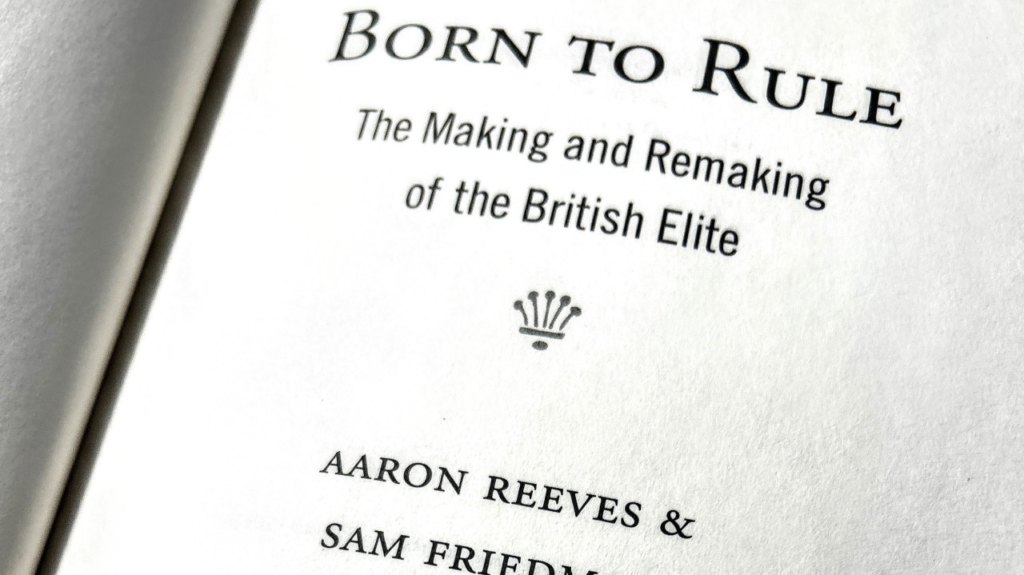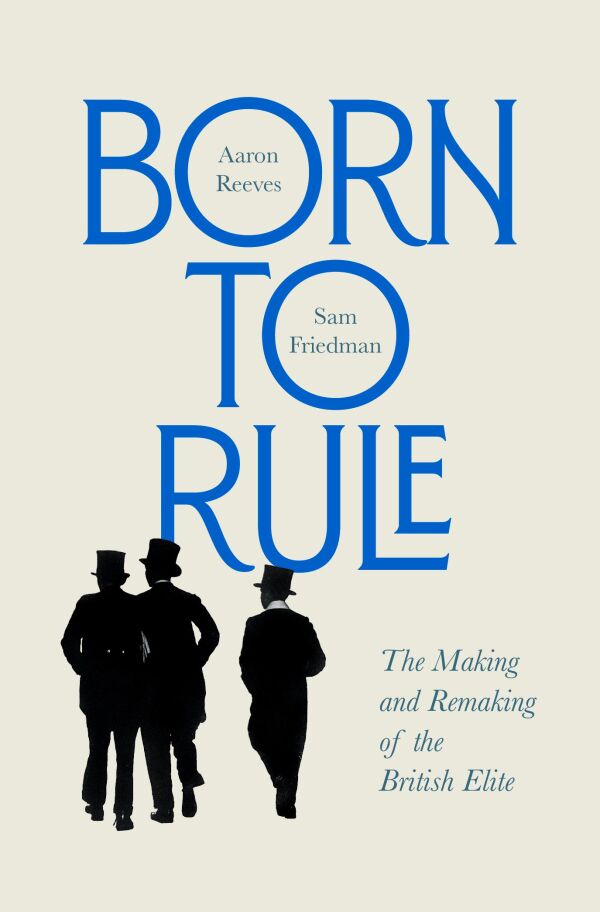Just like us, only different: Elites matter more than ever along with their conceits and denialism
Aaron Reeves and Sam Friedman, Born to Rule: the making and remaking of the British Elite, Harvard University Press 2024.
Reviewed by David McCrone
Writing a book called Born to Rule: the making and remaking of the British Elite, the sociologists Aaron Reeves and Sam Friedman probably expected they were asking for trouble. Recall the lines from Tam O’Shanter: As bees bizz out wi’ angry fyke, When plundering herds assail their byke…
This time, though, there appear to have been remarkably few buzzing bees, as far as one can tell, given that much critical comment nowadays lies behind commercial paywalls. Still, there are so many claims that something called ‘the woke elite’ is on the march, that in the words of Matthew Goodwin, academic turned new right ideologue, who are ‘united, more than anything, by their liberal cosmopolitan if not radically progressive beliefs’ (p. 158).
The problem with that assertion is not simply that it is grossly inaccurate according to the evidence, but that it plays fast and loose with one of the basic distinctions in social science; between what individuals believe to be the case (what is called ‘emic’) and what analytical evidence tells us is so (‘etic’). They are not the same thing. It’s a distinction which matters hugely, because populism has got away with claims such as Goodwin’s; that if you say it often enough, it must be true. Well, it isn’t. it is the task of the social scientist to hold the taken-for-granted up so the light can shine through.


And shine through it does in this remarkable and rigorous piece of analysis by sociologists Reeves and Friedman. They negotiated access to Who’s Who, deemed, since 1897, to be the definitive listing of the great and the good. The 2022 list has just under 40,000 short biographies (0.05% of the UK population); and not only that, its companion, Who Was Who, contains the definitive list of the dead great-and-good, producing 125,000 usable cases which can be analysed by birth cohorts between 1830 and 1979. Out of that they distill a list for online surveys, over 3000 cases, followed by more than 700 a year later, complemented still further by over 200 interviews across four birth cohorts from 1900-20, 1920-40, 1940-60, and 1960 plus.
Remarkably, not content with that, they connect up probate data (wills, to you and me) so they can follow through the impact of inherited wealth based on more than 34,000 individuals. Not content with even that, they have access to 70 interviews held in the British Library’s national life stories archive. Their work is comprehensive, innovative (using experiments and scenarios in interviews) and way beyond what anyone might expect in terms of rigour and innovation.
The Old Elite and the New Elite
So what do they find? What has emerged is ‘a new, stealthier kind of snob’ (p. 12), who works hard to present themselves as ‘ordinary’. In their words, ‘ordinariness’ performs an important signalling function for elites vis-à-vis the general public, a ‘rich form of cultural currency’. Their key point is this: at a time when social and economic inequality in Britain is far greater than for many decades, the trick (literally) is to play the card of being ‘ordinary’, to indulge in what is ‘humble-brag’. Here’s a comment from one individual: ‘I’m just a chap sitting in a little house in a suburb whose life is, as you’ve discovered, normal…quite ordinary’ (p. 41).
To which one can only reply: aye, right; that’s why you’re in Who’s Who. What is useful is making a contrast with how people imagine ‘the elite’, especially historically, and with particular reference to the life-style of the aristocracy: hunting, shooting, fishing. If you can show that you’re not one of those, and that’s not difficult these days, then you’re half-way down the road.
If you are enjoying this article and want to support Bella Caledonia to continue
and thrive, please support our Crowd Funder below, thank you …


With a media owned by billionaires and oligarchs and with your timelines flooded with propaganda, we need independent media more than ever. Help us get to £10k and develop Scotland’s longest-running alternative media project:
Nor is it fixing on the cultural pursuits of the mid-20th century elites – highbrow, and high culture. Instead, ‘the British elite … appears to have become increasingly omnivorous in its cultural tastes over the past 50 years’ (p. 74). Listen, for example, to the music they go for on Desert Island Discs. Nowadays, it’s being culturally au fait, and having pursuits like ‘the footie’. See? – just ordinary chaps, really. Like you and me.
Except that ‘wealth is largely hidden from public view and tends to go unspoken in everyday life’ (p. 96). The link between family wealth and elite reproduction has changed far less than we might think. Over the course of the 20th century, not much has dented the ability of wealthy families to propel their offspring into the most powerful and influential positions. Almost half (43%) even claim that they are from working-class backgrounds even though they actually come from professional, middle-class families. Dumbing down has its advantages.
There is a ‘symbolic market for ordinariness’, a form of impression-management put to use because ‘as elites have pulled away economically, they have become more insecure about their moral legitimacy in the eyes of the public’ (p. 225).
None of this is to imply that nothing has changed on the elite. Its political-ideological views are more diverse. However, those with serious economic clout are undoubtedly right-wing. Women make up about one-third of new entrants to Who’s Who, largely because of their associations with left-leaning cultures. There has also been slow progress on ethnic diversity, and the evidence is that elites of colour are slightly more progressive on inequality but less so than women.
While elites in Britain undoubtedly have changed their shape and form, the main channels of elite reproduction remain: the ridiculously named ‘public’ schools, notably those in the so-called Clarendon group who have always been there. So does an Oxbridge background, where you get to mix with people ‘like yourself’.


There is also something else; which most of us have encountered in one form or another: the overweening sense of entitlement, of preening self-confidence. And little wonder. If you are given a safety net of considerable proportions, which reduces risk to almost nothing, then of course you are bound to be confident. You literally cannot fail without trying really hard to do so. Said one individual: ‘… my mother had a flat where our nanny used to live, and each of us as children when we grew up, we had a spell living in the flat, and I didn’t have to pay any rent. So that was enormously important’.
Multiply that experience many times, and you begin to see where ‘confidence’ comes from. Literally, you cannot fail, and it’s very little to do with your capabilities. Having a family flat doesn’t, of course, make you a member of the elite, but you can see how having access to such assets breeds a different sense of social reality than the rest of mortals. You don’t lick it off the floor. But make sure you don’t shout it from the rooftops or draw attention to yourself. All will be well, and you can cos-play ordinariness, especially if the sociologist comes knocking at the door (which door doesn’t matter). You cannot fail. And if you do, someone will get you out of the hole. The point about attending those ‘public’ schools is that they inculcate necessary character traits: that you have unique personality traits, ‘natural’ aptitudes, and ‘good judgement’. Think of David Cameron, Boris Johnston et al and see where that got the rest of us.
How British Elites Deflect Scrutiny and Study
Does this convince the critics, such as the Cambridge historian Jonathan Parry, who wrote one of the few public reviews in London Review of Books (‘Snobs, Swots and Hacks’ LRB, 23 January 2025) Parry – and beware, academia is littered with people called Jonathan Parry – is a historian of 19th-century liberalism. Exactly why he ends up reviewing a book on elites is not at all clear, but LRB has a habit of conjuring up reviewers who don’t seem expert in the review subject. Maybe it’s whom you know rather than what; cue elites again.
Parry knows what he likes; and it’s not this. His review suffers from the ‘everyone knows’ syndrome. Thus, the book shows that many of the families that maintain their status in the wealth elite over decades can rely not just on one generation of financial support but on two. Rich grandparents are as useful as rich parents. This is hardly news.’ And again: ‘No doubt, some individuals have always pulled levers behind the scenes to benefit themselves and their families financially’. He observes: ‘In the last 32 years I have known hundreds of Cambridge history students. Almost none has wanted to be an MP.’
Which, spectacularly, is not the point. Parry snipes away: either the authors are telling us something we already know, or they are wrong, because Parry has not encountered it himself in the rarified Cambridge historical world. And then, just for a moment, the real prejudice shines through. Citing a review in 1994 by PN Furbank (you can always tell a chap by his initials), Parry observes: ‘class is a matter of rhetoric’; and ‘the proper way to study [it] is by introspection’. And here’s you and me thinking it was about relationships to the means of production.
Now, class rhetoric does matter; read your EP Thompson; and ‘by introspection’? Why? Does he mean contemplating your Oxbridge navel? It appears so. Bear in mind that studies of social class (what we call social stratification) is one of the jewels in the sociological crown in Britain, and Oxford and Cambridge are fully represented in that. Indeed, Aaron Reeves is an Oxford professor of the same, as is Sam Friedman at LSE. So perhaps we glimpse a familiar dyed-in-wool prejudice by an old-fashioned Cambridge historian who has little truck with studies of elites, better to dismiss with a wave of the hand: nothing to see here; been done already, and in any case, their work is buttressed only by ‘a handful of interviews’; breathtaking, and cavalier, in its dismissal. Parry concludes that the elite ‘cannot be reduced to a sociological unit’, on what basis, given his hostility to sociology, presumably we will never know.
One key conclusion in the light of Parry’s review: Reeves and Friedman are surely on to something. Elites matter far more than they have done for some time, even if they pretend it doesn’t. Chaps just like us, really. That’s subterfuge, and we shouldn’t be taken in, reading it for what it is: ‘a pernicious cosplay of an elite masquerading as common people’ (p. 230). In the authors’ words: ‘Today’s most influential people go to significant lengths to position themselves as regular, common, normal, and unspectacular’ (p. 222-3). Well, they would say that, wouldn’t they?

This brought to mind those photos of Boris Johnson, fiancée and baby camping on Skye.
Or rather, glamping. Or even staying in a £1600 a week holiday cottage with a tent pitched in the field next door by aides, ready for a photo opportunity to prove the PM and his family are just like regular oiks.
Note: £1600 is about the median *monthly* income for a UK taxpayer ( the average is much higher but that’s because of the tiny minority who earn squillions). MPs’ basic salary already puts them in the 95th percenile of income before or after tax. They really haven’t a clue how most people live..
Even the ‘camp fire’ by the tent was staged by aides, rather badly it must be said! 🙂
The meek will inherit nothing.
I hope people hold up social scientists to see the light shine through them, as well.
Yes, dynastic politics (which apparently became more middle-class in the Early Modern period in England, according to Germaine Greer) does not imply an official post like an MP or title such as Lord, it’s much more socially pervasive. It is not the same thing as Wikipedia’s ‘political family’.
But it would help to have comparisons outwith the British Isles, as this British version spread (through settler colonialism), reacted, returned again, and interbred with other forms. In the Anglosphere, we see dynastic politics that present slightly differently (a supposed republican gloss, say).
The biologically-differentiated nature of dynastic politics, which may ultimately aim at a caste system, has significant psycho-sexual political implications as children are prepared for gainful marriages, yet may also have access to the bodies of servants and lower-class individuals.
‘lower-class individuals’ ffs, the way some folk talk about human beings is enough to make me puke
@m, you’d prefer ‘commoners’? I’m referring to the mindsets of the elite, but also sketching typical power relations. However, children in dynastic families are likely to be vulnerable to all kinds of abuse, constraints and pressures themselves (including at the private schools which were historically often single-sex residential hot-houses of physical, sexual and emotional abuse), despite their social class, and some will abuse their schoolfellows, playmates, contemporaries. Therefore it helps to use multiple dimensions of categorisation, even if these are generalisations, they are unavoidable in context. There’s a kind of conditioned cruelty, attachment disorder and master-minion framework to this, by design. Your dynastic parents cannot have their offspring marrying their childhood sweethearts in their mid-twenties like proles.
I hope you don’t go around talking like this, it is gobbledygook
Private schools underpin the lack of opportunity for many in this country. Look at any institution in the UK today and you will see how over represented those with a private schooling background are in senior positions.
By enabling private education the state is supporting children having different opportunities before they reach the age of personal responsibility. Children already have different opportunities dependent on the background they are born into and private schools exacerbate this lack of fairness.
Private schools are bad for social mobility and for the social and economic welfare of the country. Due to private schools it is often those from a more privileged background who get the senior jobs than those with the greatest ability.
If anyone was in any doubt about how much of an advantage private schooling gives children just look at the outcry over the policy for them to lose their VAT exemption. This policy has been given a far higher prominence than it justifies because it affects so many people in influential positions in UK.
You might even say a good Labour policy.
And the current cabinet is I believe one of the least encumbered by public school boys ever. I don’t have recent figures but of the original 25 cabinet members, only one went to private school and one went to grammar school. The rest went to comprehensives.
But I agree with you about ‘public’ schools. At its most basic level there is pretty good research to show that to really address inequality in the UK you need to do two things 1) abolish public schools and 2) prevent families from handling on huge sums of money to their children, where it has stayed for hundreds of years.
Yes a good Labour policy.
Agree with your comment about inherited wealth being a massive block on social mobility.
John Le Carre, who went to private school, writes very eloquently about why they should be abolished.
Another excellent and timely article. Thank you very much indeed.